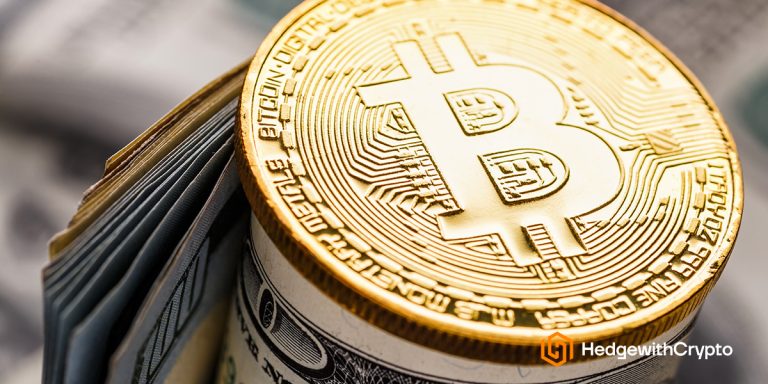8 Reasons Why Bitcoin Is a Good Hedge Against Inflation
Hedge With Crypto aims to publish information that is factual and accurate as of the date of publication. For specific information about a cryptocurrency exchange or trading platform please visit that provider’s website. This information is general in nature and is for education purposes only. Hedge With Crypto does not provide financial advice nor does it take into account your personal financial situation. We encourage you to seek financial advice from an independent financial advisor where appropriate and make your own enquiries.
Key Takeaways:
- Inflation is the increase in the price of goods and services over time, and Bitcoin’s unique characteristics make it potentially one of the best protectors against it.
- Bitcoin’s scarcity, disconnection from traditional finance, and increasing demand are why many investors rank it alongside legacy inflation-fighting assets such as gold, real estate, and bonds.
- While skeptics abound, high net worth experts like Paul Tudor Jones, Michael Saylor, and Cathie Wood all see Bitcoin as the perfect hedge against stubborn inflation.
TABLE OF CONTENTS
There is a consistent buzz within the crypto industry that Bitcoin is the perfect hedge against inflation. But does that theory hold any water? With inflation concerns meaning hard-earned money is being eroded every day, it’s not surprising everyone is looking for a better place to store wealth. With its scarce supply, disconnection from traditional finance, and growing demand, let’s uncover if Bitcoin is a good hedge against inflation.
What is Inflation?
Before tackling Bitcoin’s suitability as an inflation hedge, we need to be clear on the definition of inflation. Inflation is the silent increase in the price of goods and services with time and can occur for two main reasons. It can be triggered when demand outpaces supply or when production costs rise. Both scenarios can result in the price of goods and services steadily increasing, which means everyone gets a little less bang for their buck!
As the cost of everything increases, the value of hard-earned cash shrinks and shrinks. This is commonly known by economists as currency debasement. It becomes harder for everyone to afford the things required in everyday life. But, could Bitcoin help to prevent that from happening?
Characteristics of a Typical Inflation Hedge Asset
There are several types of assets that have been considered an inflation hedge in the past, which means that we can define the characteristics of one. A hedge asset against inflation needs to protect the value of money against the onslaught of rising prices and, therefore, is often independent of financial systems that can succumb to inflationary pressures. Assets that hold their value or even appreciate during periods of inflation are what everyone is looking for.
When thinking of assets that can protect against currency debasement, two heavyweights spring to mind: gold and real estate. These asset classes have long been trusted options for safeguarding wealth. Gold is one of the oldest forms of wealth, while real estate is tangible and has provided one of the strongest appreciating assets of the century. We’ll explore both of these options in a later section.
How Bitcoin Works and Why It Can Be Used Against Inflation
Bitcoin is a digital currency that moves to its own beat. It is not constrained by the same ties that traditional fiat currencies have. This means it is free to move without the shadow of Central Banks looming over it.
Instead of being controlled by a single controllable entity, Bitcoin functions thanks to a peer-to-peer network. Anyone using the Bitcoin network can transfer value to any other person utilizing the network without the need for centralized intermediaries. Better known as decentralization, it’s one of the key reasons why the coin has become so popular. However, there are other technical features of Bitcoin that also make it a heavyweight contender in the fight against inflation:
| Fixed Supply | Bitcoin has a maximum capped supply of 21 million. This makes it extremely scarce and resistant to inflationary pressure. Unlike everyday fiat currencies, there is no risk of any more being printed. |
| Pre-programmed Supply Reduction | Alongside a max supply of 21 million, every 4 years Bitcoin experiences a halving event which halves the rewards offered to Bitcoin miners. This means that over time less and less BTC enters circulation. |
| Proof-of-Work | The energy required to add a new block to the Bitcoin blockchain ensures that transactions are immutable and 100% trustworthy. If something is more trustworthy it greatly enhances its appeal as a reliable inflation hedge. |
| Self-custodial | Unlike traditional fiat currencies, Bitcoin can be stored by individuals. This means there is no need to rely on banks or other financial institutions for storage. |
Since the coin’s inception in 2009, Bitcoin has only faced one period of prolonged inflation. In the aftermath of Covid-19, between 2021 and 2023, global inflation increased dramatically and has provided the first insight into how Bitcoin fairs during these times. As year-on-year inflation levels in the US increased from 2% in January 2021 to 6% in November 2021, Bitcoin prices increased by 114%.
However, as high inflation levels persisted, governments around the world implemented new monetary policies to withdraw liquidity from the monetary system and, therefore, help to lower inflationary pressures. In doing so, Bitcoin retraced 76%.
So, while this suggests that Bitcoin can fair well during periods of high inflation, it also suggests that if inflation begins to influence external factors, the price of Bitcoin may suffer. It looks like more time is required to draw up a valid conclusion.
Top Reasons Why Bitcoin Is a Good Hedge Against Inflation
When it comes to protecting wealth, we know that Bitcoin is considered a heavyweight contender. But why is that? While limited supply, independence from existing financial systems, and store of value properties are some of the more obvious reasons, there are plenty more that all future crypto investors should be aware of:
- Scarcity is key. Bitcoin’s limited supply sets it apart from traditional fiat currencies. With a maximum cap of 21 million coins, it’s like digital gold that can’t be printed.
- Independent and rebellious. Bitcoin operates outside the control of central banks and governments. This level of decentralization offers a shield from inflationary pressures that plague traditional systems.
- Store of value. Just like gold, Bitcoin has built a name as a store of value. As its value isn’t tied to a specific fiat currency, it can be used as a hedge against currency devaluation.
- Accessibility. Bitcoin is accessible to anyone with an internet connection. This opens up opportunities for individuals in countries with unstable currencies that can seek refuge in Bitcoin.
- Divisibility and portability. Bitcoin is extremely divisible and you can buy fractions of a Bitcoin. Far more than fiat currencies. This divisibility improves its practicality as a medium of exchange. As a digital currency, it is also extremely portable.
- Technological innovation. The Bitcoin blockchain underlying the Bitcoin cryptocurrency is transparent, secure, immutable, and unlikely to be hacked. The innovation of blockchain tech enhances trust in the system making Bitcoin an attractive choice for those seeking reliability in the fight against currency debasement.
- Diversification. Bitcoin’s price does not always move in parallel with traditional assets like stocks and bonds. Therefore, it offers another diversification tool to reduce overall portfolio risk.
- Adaptability. Even in its short history, Bitcoin has been updated several times. This means the Bitcoin ecosystem can constantly adapt to changing economic growth. As the technology matures, Bitcoin’s advantages might strengthen.
Top Reasons Why Bitcoin Isn’t a Good Hedge Against Inflation
If Bitcoin is touted as the currency debasement savior, it’s important to also consider there are Bitcoin risks too. Although the ‘Bitcoin as a hedge’ narrative is nearly as old as Bitcoin itself, it hasn’t always performed as many expected it to, and there are still some fundamental aspects of the crypto markets that might make the coin a hard inflation-fighting pill to swallow:
- Historic performance. Although Bitcoin climbed with inflation in the period between 2020 and 2021, when inflation hit a point that central authorities had to step in, its price was hurt just like many other risk-on assets. Between 2022 and 2023 when inflation remained high, real estate faired much better.
- Volatility. Aside from altcoins, Bitcoin is one of the most volatile assets that cause fear in people wondering if Bitcoin will ever become stable in price. Now volatility can be advantageous because it leaves plenty of room for upside. But it can also leave the door open to a lot of downsides if market sentiment turns bearish, however, it's highly unlikely Bitcoin will crash to zero.
- Not widely adopted. Bitcoin adoption is growing. But not at a pace many in the crypto community would have hoped for after 14 years. Bitcoin is still not used within every country, let alone every shop or online merchant.
- Technology dependent. While technology is Bitcoin’s strength it is also its Achilles heel. Bitcoin relies heavily on its technology infrastructure, in particular, internet connectivity. While Bitcoin can technically operate without the Internet, it would not be as reliable as gold or cash if the Internet disappeared overnight.
- Alternative cryptocurrencies. Could another cryptocurrency prove to become an even better inflation hedge? Possibly. It would be naïve to rule it out as a possibility. The crypto market is expanding exponentially each year so the emergence of alternatives should be considered.
- Regulation is coming. Global cryptocurrency regulation is coming, that’s for sure. We just don’t know exactly what that will look like just yet. A lack of regulatory clarity adds another layer of unknown risk that many might feel more comfortable staying away from.
Expert Opinions on Bitcoin as an Inflation Hedge
Bitcoin’s hedging potential splits the field among economists, stock market investors, and members of financial institutions. Talk about a contentious topic. Among the best of the best, there are several that are strong Bitcoin advocates, however, there are plenty of others that believe the asset cannot battle the waves that come with ongoing inflation.
Supporters of Bitcoin as an Inflation Hedge
- Paul Tudor Jones. World-renowned investor, Paul Tudor Jones, thinks that Bitcoin could dominate as a hedge against inflation. In particular, Jones believes that Bitcoin’s scarcity and store of value properties are what make the digital asset a definite contender in the field of wealth protection.
- MicroStrategy. MicroStrategy, the business intelligence firm led by Bitcoin bull Michael Saylor, has been purchasing Bitcoin for its balance sheet since 2016. In 2023, the company invested over $4.5 billion and considers it the perfect store of value for fighting monetary inflation. Moreover, Michael Saylor's net worth has soared from this strategy.
- Cathie Wood. Ark Invest’s CEO, Cathie Wood, has openly stated she believes that Bitcoin is the perfect example of an inflation hedge. She sees Bitcoin’s digital nature and potential to disrupt traditional financial systems as significant advantages.
Critics of Bitcoin as an Inflation Hedge
- Warren Buffett. Arguably, the world’s most well-known stock market investor, Warren Buffett, has always been skeptical of Bitcoin’s role as an inflation hedge. In particular, he isn’t comfortable with its lack of intrinsic value and has, in the past, suggested that the asset is nothing more than a speculative play.
- Nouriel Roubini. Economist, Nouriel Roubini, also known as Dr. Doom, has consistently disliked the idea of Bitcoin being used to fight inflation. The coin’s volatility, lack of regulatory oversight, and vulnerability to manipulation are things that he can’t get on board with.
- Financial institutions. Finally, while there are some financial and business institutions enjoying what Bitcoin has to offer, a large swathe is still nervous about endorsing the world’s leading crypto. Many emphasize the need for regulatory frameworks and the risk of the Government's banning Bitcoin.
How Does Bitcoin Compare to Other Inflation Hedges?
Common solutions for hedging against inflation include assets like precious metals, bonds, and real estate. These assets have been favored for decades and for good reason. So, Bitcoin has some strong competition. But how does Bitcoin stack up against these tried-and-tested methods? Let's dive in and explore the strengths and challenges of each:
Precious Metals (Gold)
Strengths. Gold has a long-standing reputation as a store of value and a hedge against inflation. It is the king that Bitcoin needs to overthrow. The shiny metal's limited supply and widespread recognition contribute to its appeal as a reliable asset to avoid currency debasement.
Challenges. However, gold comes with its own set of challenges. Physical storage and security can be cumbersome and expensive. Additionally, the price of gold can be influenced by factors beyond inflation, such as industrial demand and market sentiment – so, just like Bitcoin, it’s not perfect.
Bonds
Strengths. Bonds, particularly inflation-linked bonds, are financial instruments designed to provide protection against inflation. A powerful ally. The best thing about bonds is that they adjust returns based on changes in the inflation rate. This means investors continually maintain purchasing power.
Challenges. Bond investments can be complex, requiring an understanding of the bond market and its dynamics. In addition, these assets don’t always return the same capital appreciation as others in this list.
Real Estate
Strengths: If gold was the King of inflation hedges, real estate would likely be the Queen. Property values have the potential to appreciate over time, keeping pace with, or even outpacing, inflation, and rental income can provide a handy additional cash flow stream.
Challenges. There is one significant problem with real estate. The costs that are involved. Investing in real estate can require high upfront capital and comes with a whole host of associated costs like property taxes, maintenance, and insurance. Real estate is also not immune to volatility as we have seen with housing market crashes in the past.
So that we can quickly compare these assets to Bitcoin, here’s a useful table to compare the key characteristics of each with the new contender in the ring:
| Inflation Hedge | Strengths | Challenges |
|---|---|---|
| Bitcoin | Fixed supply, decentralization, growing adoption | Price volatility, regulatory uncertainties, technological dependencies |
| Gold | Limited supply, historical value, widely recognized | Physical storage, price influenced by factors beyond inflation |
| Bonds | Adjust returns based on inflation, potential capital preservation | Complex market dynamics, potentially lower capital returns |
| Real Estate | Tangible asset, potential capital appreciation, rental income | High capital requirements, associated costs, market volatility |
Frequently Asked Questions
Should I buy Bitcoin during inflation?
The decision to buy Bitcoin during a period of inflation depends on investment goals and the level of risk you’re willing to take. Bitcoin price can be volatile. Are you willing to navigate short-term volatility for longer-term potential? One thing to consider is that it's often better to be proactive rather than reactive when it comes to inflation. Many investors build a portfolio around dealing with inflation ahead of time.
Why is Bitcoin good for inflation?
Bitcoin is considered a good asset for inflation due to some extremely unique characteristics. Its fixed supply of 21 million means that it is resistant to typical inflationary pressure that leads to currency debasement and its decentralized framework means that it is not subject to the same monetary policies as traditional currencies.



